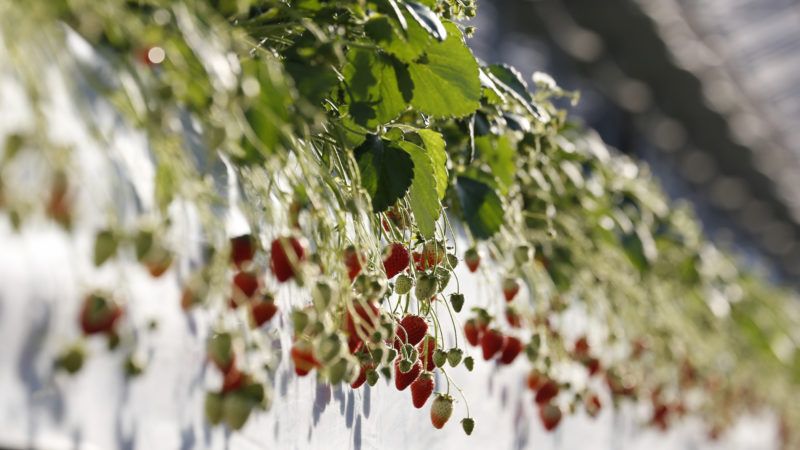Lawsuit Demands USDA Stop Certifying Hydroponic Foods as 'Organic'
Dirt farmers want the feds to stack the deck in their favor.

Earlier this month, a group of organic farmers and advocates sued the U.S. Department of Agriculture (USDA) over the agency's certification of some hydroponic produce as "organic." The suit seeks to bar the USDA from awarding its organic seal to hydroponically raised foods.
Hydroponics is a type of farming or gardening that uses water (rather than soil) as a growth medium for a variety of fruits, vegetables, herbs, and other plants—including cannabis. Hydroponic growth can be accomplished indoors with the addition of commercially available lighting, nutrients, and other materials.
The suit was filed by the Center for Food Safety (CFS)—a "litigious" California-based nonprofit that boasts nearly a million members—along with a handful of organic farmers and the Maine Organic Farmers & Gardeners Association. CFS petitioned the USDA early last year, asking the agency to develop rules that would prohibit organic certification of hydroponic operations. The agency denied the petition in June.
The suit alleges that the USDA's actions fly in the face of the 1990 law that established the agency's authority over the labeling of organic foods. That argument hinges in large part on the language around fostering soil fertility in the 1990 law, the Organic Foods Production Act (OFPA), which gave rise to the USDA's certification program. Under the law, which refers to "soil" only a handful of times, farmers must have in place an "organic plan [which] shall contain provisions designed to foster soil fertility, primarily through the management of the organic content of the soil." A farmer raising crops she wishes to market under the USDA's organic seal must submit its organic plan to a certifying body such as Oregon Tilth.
That group, the nation's first organic certifying body, was established in the early 1970s. The word "tilth" refers to soil quality.
"Organic farmers and consumers believe that the Organic label means not just growing food in soil, but improving the fertility of that soil," says Andrew Kimbrell, executive director of the Center for Food Safety, in a release announcing the lawsuit. "USDA's loophole for corporate hydroponics to be sold under the Organic label guts the very essence of 'Organic.'"
According to the handful of farmers who are part of the lawsuit—and who grow a host of organic fruits and vegetables, many of them having done so for decades—they're facing stiff competition from (typically) larger hydroponic farmers, who incur lower costs to grow the same food and can therefore offer more value to consumers for the same products.
What exactly is "organic"? For regulatory purposes, the term refers as much to what doesn't go into producing a particular food as what does go into it. As I explained in a 2016 column, under USDA rules the term "organic" refers to foods that are produced 1) "without excluded methods;" 2) " using allowed substances;" and 3) under the oversight of a USDA-authorized organic certifying agent.
The hydroponic-organic fight dates back to at least 2010, according to Food Dive, a news website that has a helpful chronology on the fight.
As I detailed in 2016, the Cornucopia Institute, which promotes organic foods, had recently filed a complaint with the USDA over hydroponic organics.
"It's not hard to make the case that soil is as central to the concept of 'organic' as any other idea or thing," I wrote. "On the other hand, it's also not hard to make the case that soil isn't central to the concept of what is and isn't organic. While most of our food is grown in soil, only a small percentage of that food is 'organic' under USDA rules. In other words, whether or not food is grown in soil tells us little that's useful about whether that food is 'organic' or not."
When I last wrote about this issue, the Boston Globe editorial board had just weighed in on the debate over hydroponics and organics. Step off, the paper told the USDA.
"It would be better for the authorities to focus on ensuring the safety of food and the accuracy of label information about things like nutrition and allergens, while letting consumers figure out for themselves what organic means to them," write the Globe's editors.
That latter point is so important—and something USDA rules simply don't allow for. It's also just one of the many flaws inherent in the USDA's oversight of organic food. For example, I detail the arguments of several leading supporters of organic foods who are also leading critics of the USDA's organic labeling program in my book, Biting the Hands that Feed Us: How Fewer, Smarter Laws Would Make Our Food System More Sustainable
If CFS and its fellow plaintiffs lose, then the result will likely be more innovation, more competition, and lower costs for consumers. The USDA's organic seal has very little integrity to begin with. Allowing hydroponic crops to be certified as organic—while not as welcome as would be getting the USDA out of the organic-labeling business altogether—won't damage that integrity any further.


Show Comments (136)